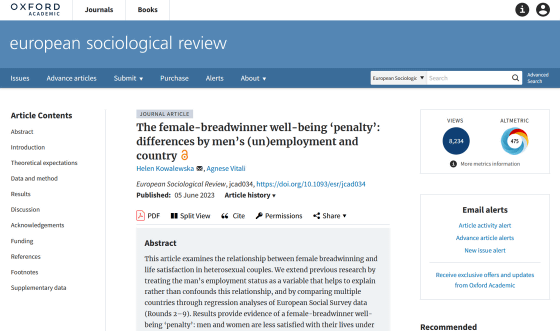Research results that couples whose women are the only breadwinners, not men, are less happy

In today's world where work styles and family styles have diversified, it is not uncommon for the wife, not the husband, to work as the breadwinner of the household. However, in a study conducted by Helen Kovalewska, a sociology lecturer at
female-breadwinner well-being 'penalty': differences by men's (un)employment and country | European Sociological Review | Oxford Academic
https://doi.org/10.1093/esr/jcad034

Men 'less satisfied with life' when their female partner is the only earner – new study
https://www.bath.ac.uk/announcements/men-less-satisfied-with-life-when-their-female-partner-is-the-only-earner-new-study/
Couples in which the woman is the only earner report lower life satisfaction – new research
https://theconversation.com/couples-in-which-the-woman-is-the-only-earner-report-lower-life-satisfaction-new-research-208503
Even in modern society where gender equality has been promoted, there are differences between men and women in various aspects, and research results have been reported that social gender norms affect the health and salaries of men and women. Therefore, the research team of Mr. Kovalewska et al. Conducted a study to analyze the data of the European Social Survey (ESS) conducted in nine countries: Finland, France, Germany, the United Kingdom, Ireland, Portugal, Spain, Slovenia, and Poland.
More than 42,000 subjects included in the target data, aged between 18 and 65, and all living with opposite-sex partners. In addition, cases where adults other than couples (either parents-in-law or friends, etc.) live together, cases where either or both are students, cases where there is a disease or disability that makes it impossible to work permanently, cases where work has already been retired, cases in military service, etc. were excluded.
In addition to responding to household income status, subjects evaluated how satisfied they were with their lives on a scale of '0' to '10'. In addition, it seems that most subjects scored between '5' and '8'.

As a result of analyzing the data, the average satisfaction with life for men was '7.24' and for women was '7.31'. On the other hand, it turned out that the average satisfaction level for men was '5.86' for households where women were the sole breadwinners, and '7.16' for men who were the sole breadwinners, showing a large difference. Women's satisfaction with life was '6.33' if the woman was the sole breadwinner, and '7.10' if the man was the sole breadwinner. Although this trend was strongly seen in Germany, England, Ireland, Spain, etc., it was also seen in countries such as Finland where gender equality is progressing, and it turned out that it is a universal trend throughout Europe.
Kovalewska said that being the only breadwinner was a heavy psychological burden for men, and found that women were more satisfied with their lives when they were unemployed. In fact, when considering men's social factors, income, gender attitudes, etc., unemployed men are significantly more satisfied when women are unemployed together than when women are earning.
Men's satisfaction was worse when they were forced to be unemployed than when they intentionally did not work or fulfilled household chores and other domestic responsibilities. The research team believes that unemployment is associated with significant psychological burdens such as self-doubt, uncertainty, loneliness, and

As for the reason why women's satisfaction is lower when the only breadwinner in the household is a woman, it is possible that the reason is that double-income households and men have lower incomes than households where men are the breadwinners, making life difficult. In addition, the fact that the satisfaction level of men who are partners decreases may also be the cause of the decrease in women's satisfaction levels.
When analyzing factors such as household economic situation, age, presence or absence of children, and attitudes toward gender norms, the decline in women's satisfaction when women are the sole breadwinners was found to be suppressed to only ``-0.048'' compared to when men were the sole breadwinners. However, in this case, the research team said that men's satisfaction was still low by ``-0.585'', especially in Germany, men's satisfaction was ``-1.112''.
This result suggests that across Europe, ``being a household breadwinner'' is still central to men's self-consciousness, and they are not getting out of ``being a man'' and ``being a good father''. Also, unemployed men are less likely to build community and social connections, which may result in loneliness.
``Our findings suggest that gender norms influence how couples deal with unemployment, and men place more emphasis on their employment status than women,'' said Kovalewska.

Related Posts:
in Science, Posted by log1h_ik







